Research: Mental Disabilities and UK Work Organization Performance
VerifiedAdded on 2021/02/21
|16
|3341
|478
Report
AI Summary
This report explores the impact and economic effects of mental disabilities in British work organizations. It investigates the prevalence of mental health issues, potential management responses, and the relationship between mental health and organizational performance in the UK. The research employs a systematic literature review, analyzing secondary sources such as academic studies and grey literature. The study aims to understand the implications of mental incapacity on business, evaluate existing practices for mental well-being, and analyze standard work practices against legislation. The methodology includes a qualitative and quantitative approach, utilizing an exploratory research design and a realism philosophy. The report highlights the significance of addressing mental disabilities for improved employee efficiency, financial management, and overall organizational success. The findings aim to provide solutions for workplace inefficiencies and promote better mental health outcomes for employees and improved economic outcomes for organizations.
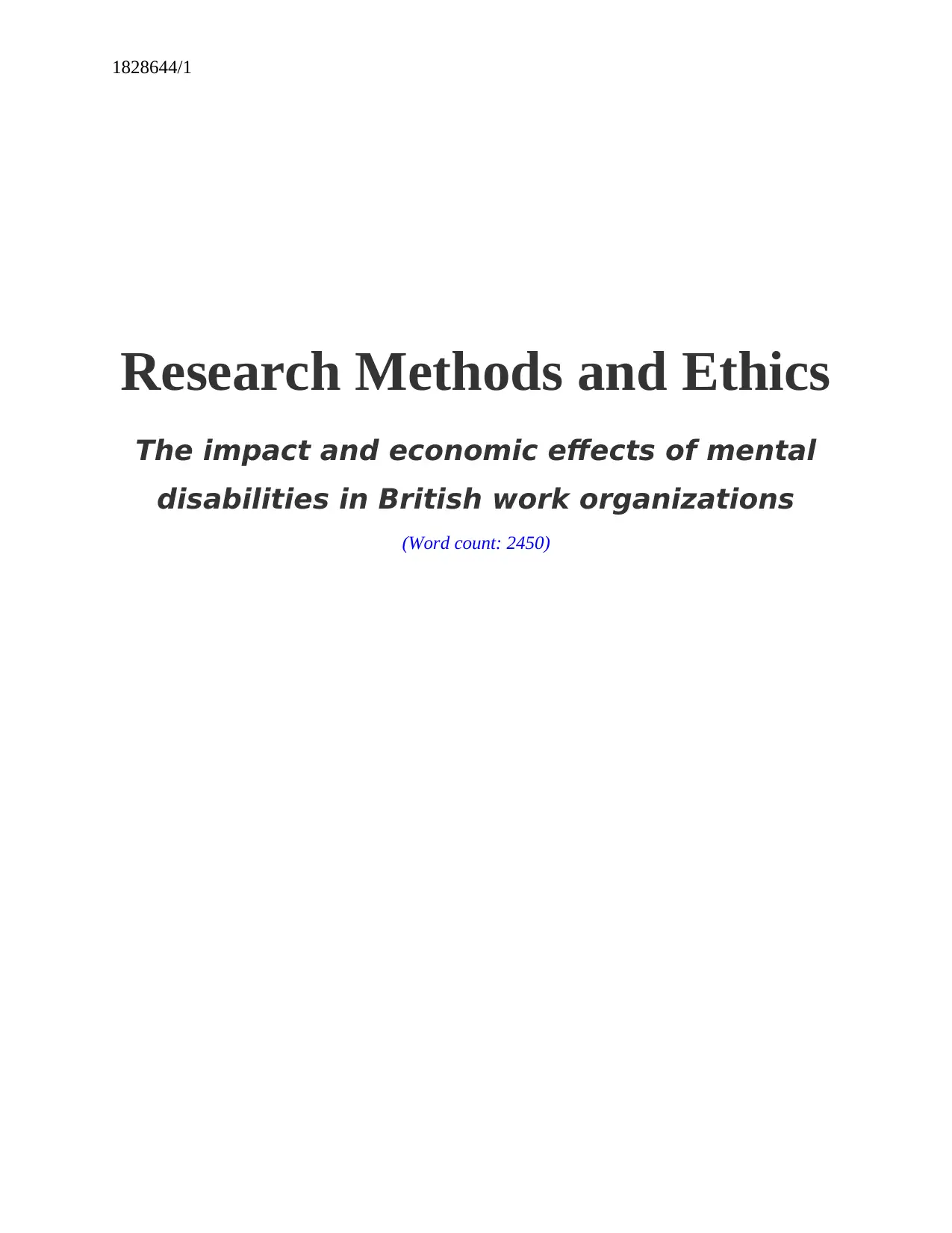
1828644/1
Research Methods and Ethics
The impact and economic effects of mental
disabilities in British work organizations
(Word count: 2450)
Research Methods and Ethics
The impact and economic effects of mental
disabilities in British work organizations
(Word count: 2450)
Paraphrase This Document
Need a fresh take? Get an instant paraphrase of this document with our AI Paraphraser
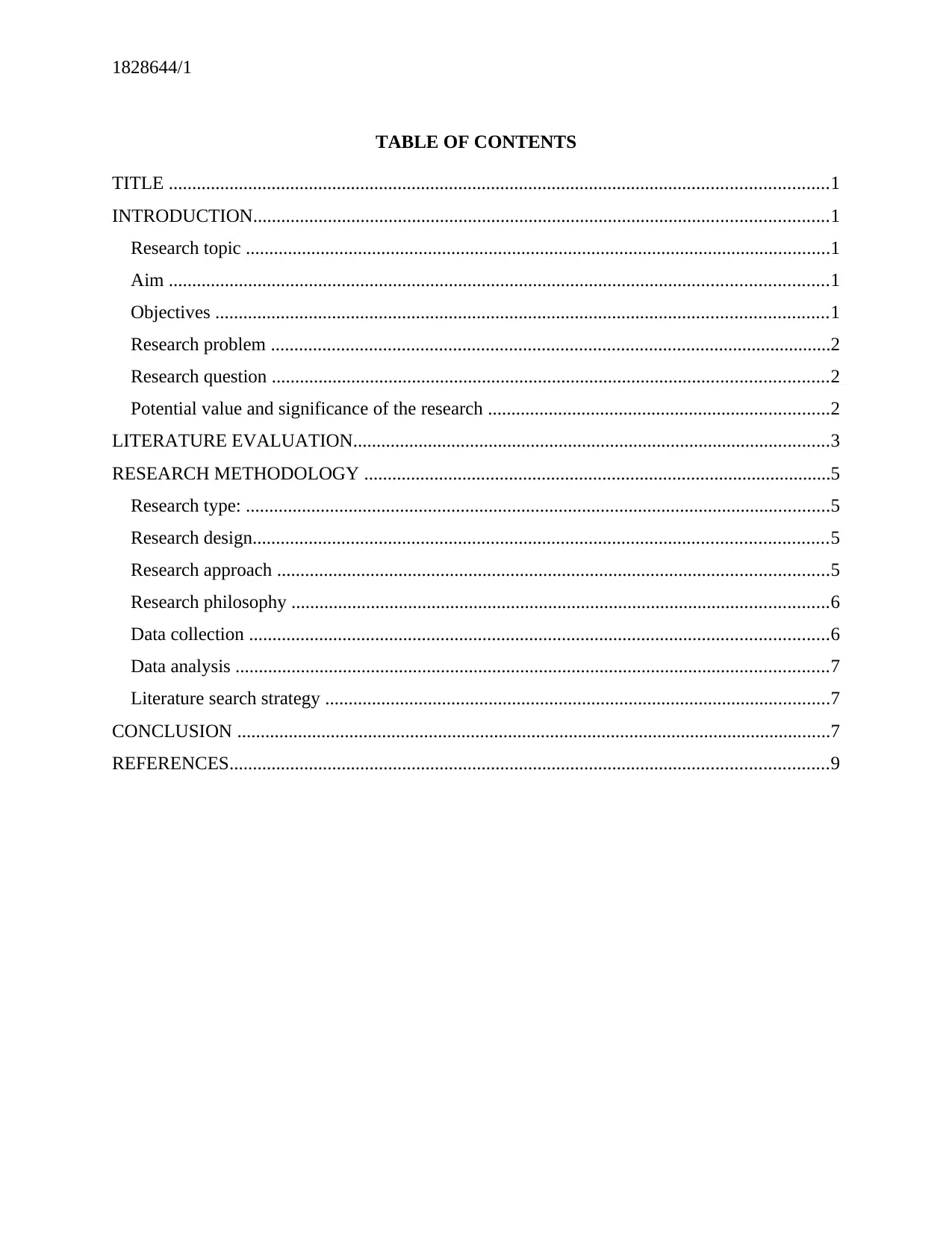
1828644/1
TABLE OF CONTENTS
TITLE .............................................................................................................................................1
INTRODUCTION...........................................................................................................................1
Research topic .............................................................................................................................1
Aim .............................................................................................................................................1
Objectives ...................................................................................................................................1
Research problem ........................................................................................................................2
Research question .......................................................................................................................2
Potential value and significance of the research .........................................................................2
LITERATURE EVALUATION......................................................................................................3
RESEARCH METHODOLOGY ....................................................................................................5
Research type: .............................................................................................................................5
Research design...........................................................................................................................5
Research approach ......................................................................................................................5
Research philosophy ...................................................................................................................6
Data collection ............................................................................................................................6
Data analysis ...............................................................................................................................7
Literature search strategy ............................................................................................................7
CONCLUSION ...............................................................................................................................7
REFERENCES................................................................................................................................9
TABLE OF CONTENTS
TITLE .............................................................................................................................................1
INTRODUCTION...........................................................................................................................1
Research topic .............................................................................................................................1
Aim .............................................................................................................................................1
Objectives ...................................................................................................................................1
Research problem ........................................................................................................................2
Research question .......................................................................................................................2
Potential value and significance of the research .........................................................................2
LITERATURE EVALUATION......................................................................................................3
RESEARCH METHODOLOGY ....................................................................................................5
Research type: .............................................................................................................................5
Research design...........................................................................................................................5
Research approach ......................................................................................................................5
Research philosophy ...................................................................................................................6
Data collection ............................................................................................................................6
Data analysis ...............................................................................................................................7
Literature search strategy ............................................................................................................7
CONCLUSION ...............................................................................................................................7
REFERENCES................................................................................................................................9
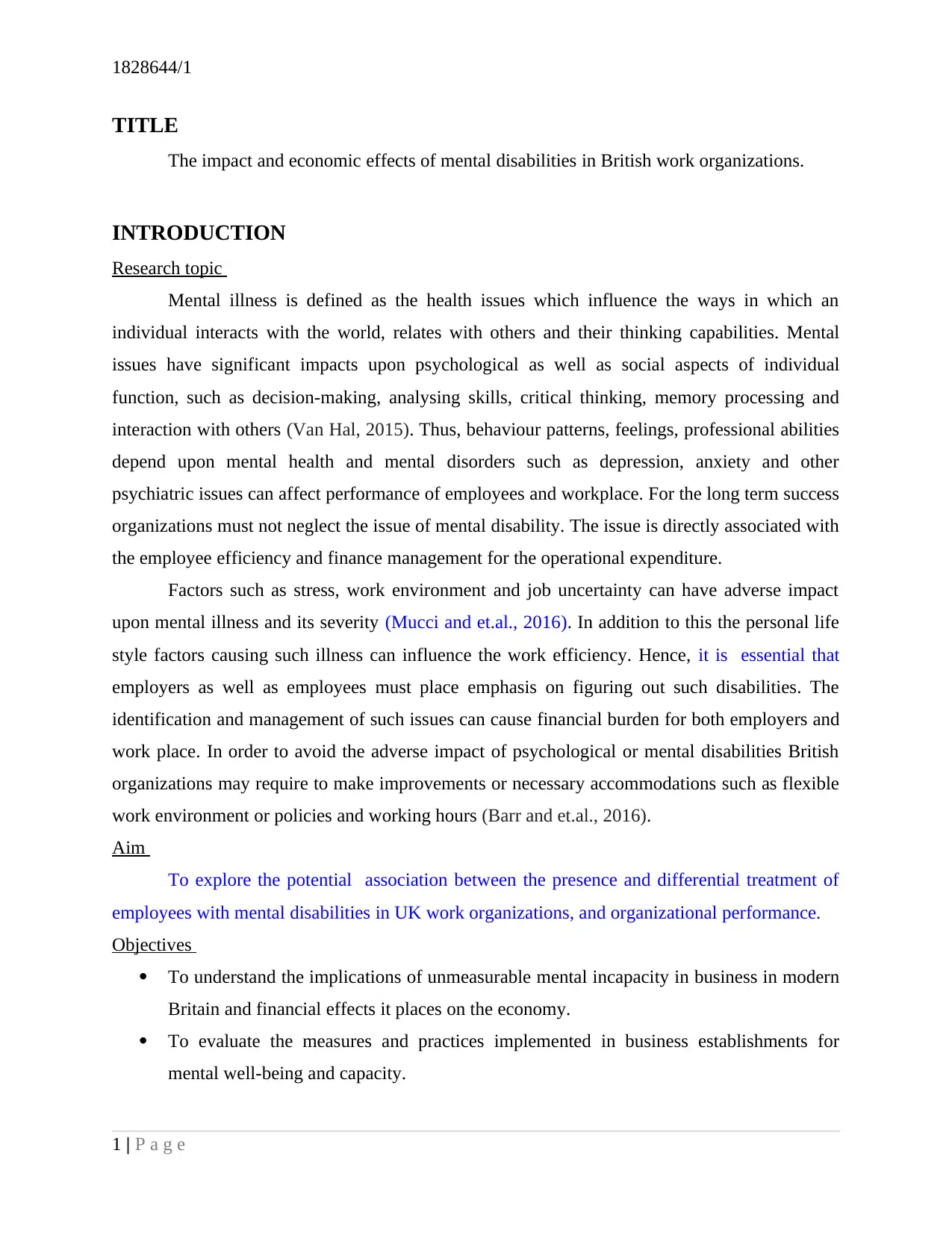
1828644/1
TITLE
The impact and economic effects of mental disabilities in British work organizations.
INTRODUCTION
Research topic
Mental illness is defined as the health issues which influence the ways in which an
individual interacts with the world, relates with others and their thinking capabilities. Mental
issues have significant impacts upon psychological as well as social aspects of individual
function, such as decision-making, analysing skills, critical thinking, memory processing and
interaction with others (Van Hal, 2015). Thus, behaviour patterns, feelings, professional abilities
depend upon mental health and mental disorders such as depression, anxiety and other
psychiatric issues can affect performance of employees and workplace. For the long term success
organizations must not neglect the issue of mental disability. The issue is directly associated with
the employee efficiency and finance management for the operational expenditure.
Factors such as stress, work environment and job uncertainty can have adverse impact
upon mental illness and its severity (Mucci and et.al., 2016). In addition to this the personal life
style factors causing such illness can influence the work efficiency. Hence, it is essential that
employers as well as employees must place emphasis on figuring out such disabilities. The
identification and management of such issues can cause financial burden for both employers and
work place. In order to avoid the adverse impact of psychological or mental disabilities British
organizations may require to make improvements or necessary accommodations such as flexible
work environment or policies and working hours (Barr and et.al., 2016).
Aim
To explore the potential association between the presence and differential treatment of
employees with mental disabilities in UK work organizations, and organizational performance.
Objectives
To understand the implications of unmeasurable mental incapacity in business in modern
Britain and financial effects it places on the economy.
To evaluate the measures and practices implemented in business establishments for
mental well-being and capacity.
1 | P a g e
TITLE
The impact and economic effects of mental disabilities in British work organizations.
INTRODUCTION
Research topic
Mental illness is defined as the health issues which influence the ways in which an
individual interacts with the world, relates with others and their thinking capabilities. Mental
issues have significant impacts upon psychological as well as social aspects of individual
function, such as decision-making, analysing skills, critical thinking, memory processing and
interaction with others (Van Hal, 2015). Thus, behaviour patterns, feelings, professional abilities
depend upon mental health and mental disorders such as depression, anxiety and other
psychiatric issues can affect performance of employees and workplace. For the long term success
organizations must not neglect the issue of mental disability. The issue is directly associated with
the employee efficiency and finance management for the operational expenditure.
Factors such as stress, work environment and job uncertainty can have adverse impact
upon mental illness and its severity (Mucci and et.al., 2016). In addition to this the personal life
style factors causing such illness can influence the work efficiency. Hence, it is essential that
employers as well as employees must place emphasis on figuring out such disabilities. The
identification and management of such issues can cause financial burden for both employers and
work place. In order to avoid the adverse impact of psychological or mental disabilities British
organizations may require to make improvements or necessary accommodations such as flexible
work environment or policies and working hours (Barr and et.al., 2016).
Aim
To explore the potential association between the presence and differential treatment of
employees with mental disabilities in UK work organizations, and organizational performance.
Objectives
To understand the implications of unmeasurable mental incapacity in business in modern
Britain and financial effects it places on the economy.
To evaluate the measures and practices implemented in business establishments for
mental well-being and capacity.
1 | P a g e
⊘ This is a preview!⊘
Do you want full access?
Subscribe today to unlock all pages.

Trusted by 1+ million students worldwide
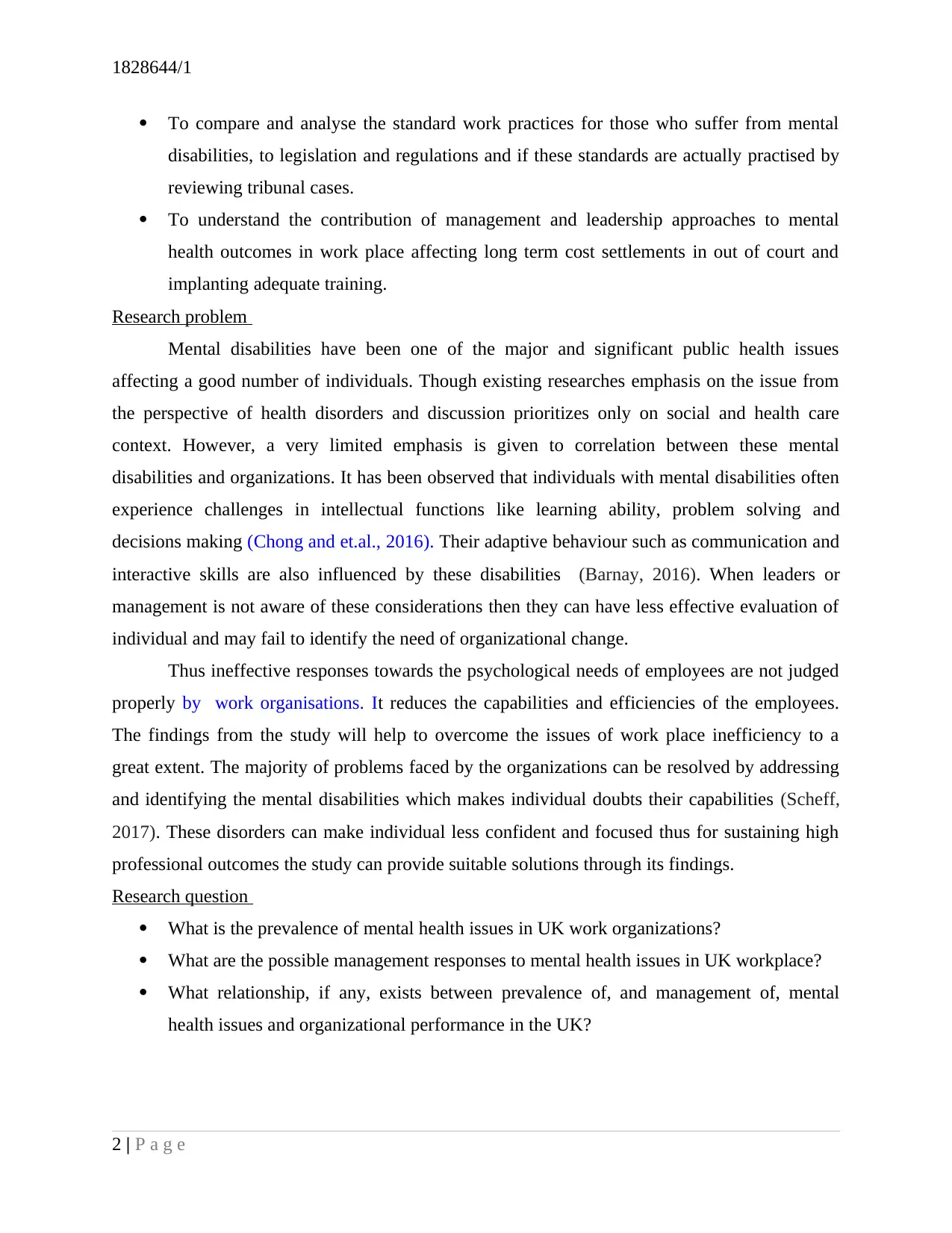
1828644/1
To compare and analyse the standard work practices for those who suffer from mental
disabilities, to legislation and regulations and if these standards are actually practised by
reviewing tribunal cases.
To understand the contribution of management and leadership approaches to mental
health outcomes in work place affecting long term cost settlements in out of court and
implanting adequate training.
Research problem
Mental disabilities have been one of the major and significant public health issues
affecting a good number of individuals. Though existing researches emphasis on the issue from
the perspective of health disorders and discussion prioritizes only on social and health care
context. However, a very limited emphasis is given to correlation between these mental
disabilities and organizations. It has been observed that individuals with mental disabilities often
experience challenges in intellectual functions like learning ability, problem solving and
decisions making (Chong and et.al., 2016). Their adaptive behaviour such as communication and
interactive skills are also influenced by these disabilities (Barnay, 2016). When leaders or
management is not aware of these considerations then they can have less effective evaluation of
individual and may fail to identify the need of organizational change.
Thus ineffective responses towards the psychological needs of employees are not judged
properly by work organisations. It reduces the capabilities and efficiencies of the employees.
The findings from the study will help to overcome the issues of work place inefficiency to a
great extent. The majority of problems faced by the organizations can be resolved by addressing
and identifying the mental disabilities which makes individual doubts their capabilities (Scheff,
2017). These disorders can make individual less confident and focused thus for sustaining high
professional outcomes the study can provide suitable solutions through its findings.
Research question
What is the prevalence of mental health issues in UK work organizations?
What are the possible management responses to mental health issues in UK workplace?
What relationship, if any, exists between prevalence of, and management of, mental
health issues and organizational performance in the UK?
2 | P a g e
To compare and analyse the standard work practices for those who suffer from mental
disabilities, to legislation and regulations and if these standards are actually practised by
reviewing tribunal cases.
To understand the contribution of management and leadership approaches to mental
health outcomes in work place affecting long term cost settlements in out of court and
implanting adequate training.
Research problem
Mental disabilities have been one of the major and significant public health issues
affecting a good number of individuals. Though existing researches emphasis on the issue from
the perspective of health disorders and discussion prioritizes only on social and health care
context. However, a very limited emphasis is given to correlation between these mental
disabilities and organizations. It has been observed that individuals with mental disabilities often
experience challenges in intellectual functions like learning ability, problem solving and
decisions making (Chong and et.al., 2016). Their adaptive behaviour such as communication and
interactive skills are also influenced by these disabilities (Barnay, 2016). When leaders or
management is not aware of these considerations then they can have less effective evaluation of
individual and may fail to identify the need of organizational change.
Thus ineffective responses towards the psychological needs of employees are not judged
properly by work organisations. It reduces the capabilities and efficiencies of the employees.
The findings from the study will help to overcome the issues of work place inefficiency to a
great extent. The majority of problems faced by the organizations can be resolved by addressing
and identifying the mental disabilities which makes individual doubts their capabilities (Scheff,
2017). These disorders can make individual less confident and focused thus for sustaining high
professional outcomes the study can provide suitable solutions through its findings.
Research question
What is the prevalence of mental health issues in UK work organizations?
What are the possible management responses to mental health issues in UK workplace?
What relationship, if any, exists between prevalence of, and management of, mental
health issues and organizational performance in the UK?
2 | P a g e
Paraphrase This Document
Need a fresh take? Get an instant paraphrase of this document with our AI Paraphraser
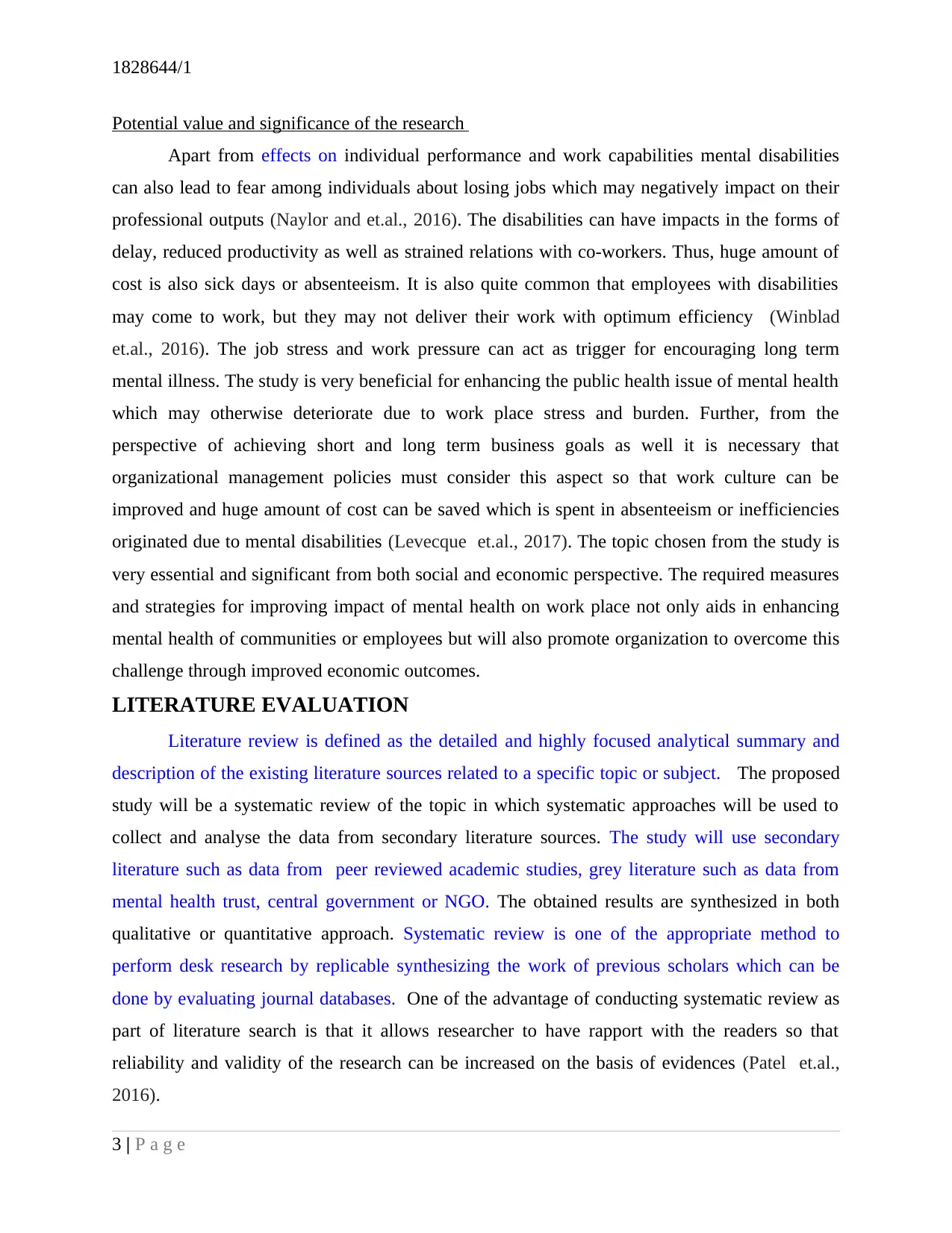
1828644/1
Potential value and significance of the research
Apart from effects on individual performance and work capabilities mental disabilities
can also lead to fear among individuals about losing jobs which may negatively impact on their
professional outputs (Naylor and et.al., 2016). The disabilities can have impacts in the forms of
delay, reduced productivity as well as strained relations with co-workers. Thus, huge amount of
cost is also sick days or absenteeism. It is also quite common that employees with disabilities
may come to work, but they may not deliver their work with optimum efficiency (Winblad
et.al., 2016). The job stress and work pressure can act as trigger for encouraging long term
mental illness. The study is very beneficial for enhancing the public health issue of mental health
which may otherwise deteriorate due to work place stress and burden. Further, from the
perspective of achieving short and long term business goals as well it is necessary that
organizational management policies must consider this aspect so that work culture can be
improved and huge amount of cost can be saved which is spent in absenteeism or inefficiencies
originated due to mental disabilities (Levecque et.al., 2017). The topic chosen from the study is
very essential and significant from both social and economic perspective. The required measures
and strategies for improving impact of mental health on work place not only aids in enhancing
mental health of communities or employees but will also promote organization to overcome this
challenge through improved economic outcomes.
LITERATURE EVALUATION
Literature review is defined as the detailed and highly focused analytical summary and
description of the existing literature sources related to a specific topic or subject. The proposed
study will be a systematic review of the topic in which systematic approaches will be used to
collect and analyse the data from secondary literature sources. The study will use secondary
literature such as data from peer reviewed academic studies, grey literature such as data from
mental health trust, central government or NGO. The obtained results are synthesized in both
qualitative or quantitative approach. Systematic review is one of the appropriate method to
perform desk research by replicable synthesizing the work of previous scholars which can be
done by evaluating journal databases. One of the advantage of conducting systematic review as
part of literature search is that it allows researcher to have rapport with the readers so that
reliability and validity of the research can be increased on the basis of evidences (Patel et.al.,
2016).
3 | P a g e
Potential value and significance of the research
Apart from effects on individual performance and work capabilities mental disabilities
can also lead to fear among individuals about losing jobs which may negatively impact on their
professional outputs (Naylor and et.al., 2016). The disabilities can have impacts in the forms of
delay, reduced productivity as well as strained relations with co-workers. Thus, huge amount of
cost is also sick days or absenteeism. It is also quite common that employees with disabilities
may come to work, but they may not deliver their work with optimum efficiency (Winblad
et.al., 2016). The job stress and work pressure can act as trigger for encouraging long term
mental illness. The study is very beneficial for enhancing the public health issue of mental health
which may otherwise deteriorate due to work place stress and burden. Further, from the
perspective of achieving short and long term business goals as well it is necessary that
organizational management policies must consider this aspect so that work culture can be
improved and huge amount of cost can be saved which is spent in absenteeism or inefficiencies
originated due to mental disabilities (Levecque et.al., 2017). The topic chosen from the study is
very essential and significant from both social and economic perspective. The required measures
and strategies for improving impact of mental health on work place not only aids in enhancing
mental health of communities or employees but will also promote organization to overcome this
challenge through improved economic outcomes.
LITERATURE EVALUATION
Literature review is defined as the detailed and highly focused analytical summary and
description of the existing literature sources related to a specific topic or subject. The proposed
study will be a systematic review of the topic in which systematic approaches will be used to
collect and analyse the data from secondary literature sources. The study will use secondary
literature such as data from peer reviewed academic studies, grey literature such as data from
mental health trust, central government or NGO. The obtained results are synthesized in both
qualitative or quantitative approach. Systematic review is one of the appropriate method to
perform desk research by replicable synthesizing the work of previous scholars which can be
done by evaluating journal databases. One of the advantage of conducting systematic review as
part of literature search is that it allows researcher to have rapport with the readers so that
reliability and validity of the research can be increased on the basis of evidences (Patel et.al.,
2016).
3 | P a g e
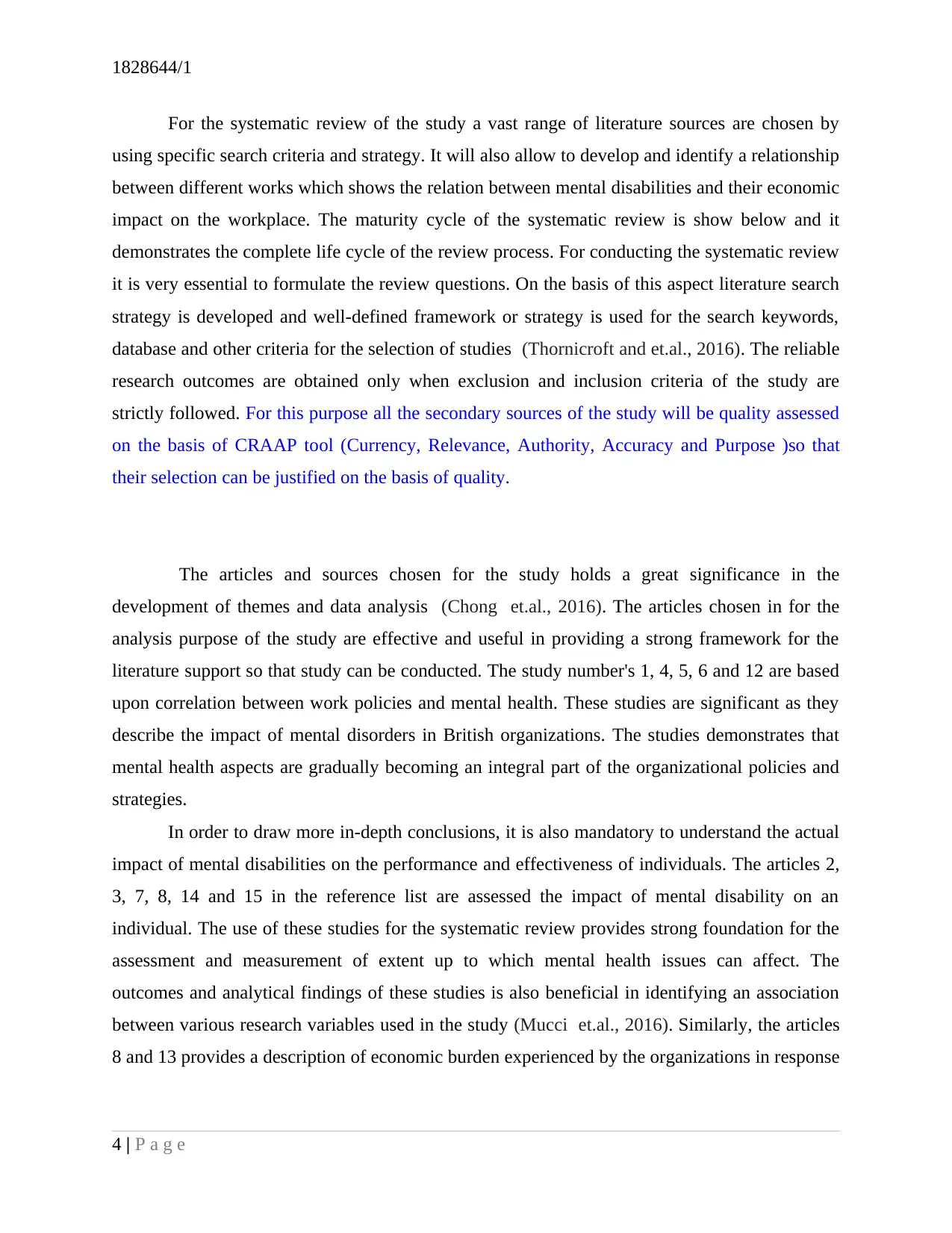
1828644/1
For the systematic review of the study a vast range of literature sources are chosen by
using specific search criteria and strategy. It will also allow to develop and identify a relationship
between different works which shows the relation between mental disabilities and their economic
impact on the workplace. The maturity cycle of the systematic review is show below and it
demonstrates the complete life cycle of the review process. For conducting the systematic review
it is very essential to formulate the review questions. On the basis of this aspect literature search
strategy is developed and well-defined framework or strategy is used for the search keywords,
database and other criteria for the selection of studies (Thornicroft and et.al., 2016). The reliable
research outcomes are obtained only when exclusion and inclusion criteria of the study are
strictly followed. For this purpose all the secondary sources of the study will be quality assessed
on the basis of CRAAP tool (Currency, Relevance, Authority, Accuracy and Purpose )so that
their selection can be justified on the basis of quality.
The articles and sources chosen for the study holds a great significance in the
development of themes and data analysis (Chong et.al., 2016). The articles chosen in for the
analysis purpose of the study are effective and useful in providing a strong framework for the
literature support so that study can be conducted. The study number's 1, 4, 5, 6 and 12 are based
upon correlation between work policies and mental health. These studies are significant as they
describe the impact of mental disorders in British organizations. The studies demonstrates that
mental health aspects are gradually becoming an integral part of the organizational policies and
strategies.
In order to draw more in-depth conclusions, it is also mandatory to understand the actual
impact of mental disabilities on the performance and effectiveness of individuals. The articles 2,
3, 7, 8, 14 and 15 in the reference list are assessed the impact of mental disability on an
individual. The use of these studies for the systematic review provides strong foundation for the
assessment and measurement of extent up to which mental health issues can affect. The
outcomes and analytical findings of these studies is also beneficial in identifying an association
between various research variables used in the study (Mucci et.al., 2016). Similarly, the articles
8 and 13 provides a description of economic burden experienced by the organizations in response
4 | P a g e
For the systematic review of the study a vast range of literature sources are chosen by
using specific search criteria and strategy. It will also allow to develop and identify a relationship
between different works which shows the relation between mental disabilities and their economic
impact on the workplace. The maturity cycle of the systematic review is show below and it
demonstrates the complete life cycle of the review process. For conducting the systematic review
it is very essential to formulate the review questions. On the basis of this aspect literature search
strategy is developed and well-defined framework or strategy is used for the search keywords,
database and other criteria for the selection of studies (Thornicroft and et.al., 2016). The reliable
research outcomes are obtained only when exclusion and inclusion criteria of the study are
strictly followed. For this purpose all the secondary sources of the study will be quality assessed
on the basis of CRAAP tool (Currency, Relevance, Authority, Accuracy and Purpose )so that
their selection can be justified on the basis of quality.
The articles and sources chosen for the study holds a great significance in the
development of themes and data analysis (Chong et.al., 2016). The articles chosen in for the
analysis purpose of the study are effective and useful in providing a strong framework for the
literature support so that study can be conducted. The study number's 1, 4, 5, 6 and 12 are based
upon correlation between work policies and mental health. These studies are significant as they
describe the impact of mental disorders in British organizations. The studies demonstrates that
mental health aspects are gradually becoming an integral part of the organizational policies and
strategies.
In order to draw more in-depth conclusions, it is also mandatory to understand the actual
impact of mental disabilities on the performance and effectiveness of individuals. The articles 2,
3, 7, 8, 14 and 15 in the reference list are assessed the impact of mental disability on an
individual. The use of these studies for the systematic review provides strong foundation for the
assessment and measurement of extent up to which mental health issues can affect. The
outcomes and analytical findings of these studies is also beneficial in identifying an association
between various research variables used in the study (Mucci et.al., 2016). Similarly, the articles
8 and 13 provides a description of economic burden experienced by the organizations in response
4 | P a g e
⊘ This is a preview!⊘
Do you want full access?
Subscribe today to unlock all pages.

Trusted by 1+ million students worldwide
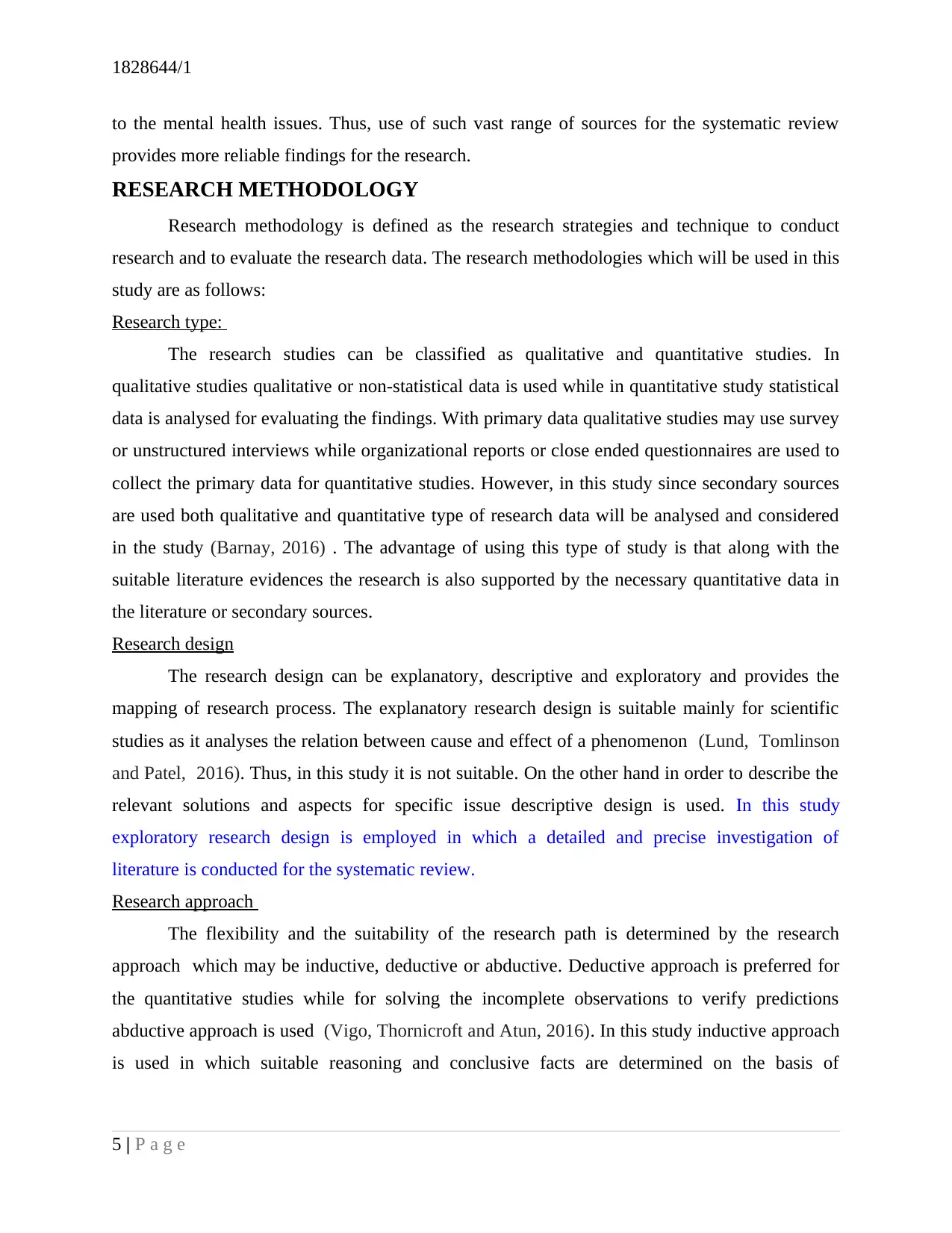
1828644/1
to the mental health issues. Thus, use of such vast range of sources for the systematic review
provides more reliable findings for the research.
RESEARCH METHODOLOGY
Research methodology is defined as the research strategies and technique to conduct
research and to evaluate the research data. The research methodologies which will be used in this
study are as follows:
Research type:
The research studies can be classified as qualitative and quantitative studies. In
qualitative studies qualitative or non-statistical data is used while in quantitative study statistical
data is analysed for evaluating the findings. With primary data qualitative studies may use survey
or unstructured interviews while organizational reports or close ended questionnaires are used to
collect the primary data for quantitative studies. However, in this study since secondary sources
are used both qualitative and quantitative type of research data will be analysed and considered
in the study (Barnay, 2016) . The advantage of using this type of study is that along with the
suitable literature evidences the research is also supported by the necessary quantitative data in
the literature or secondary sources.
Research design
The research design can be explanatory, descriptive and exploratory and provides the
mapping of research process. The explanatory research design is suitable mainly for scientific
studies as it analyses the relation between cause and effect of a phenomenon (Lund, Tomlinson
and Patel, 2016). Thus, in this study it is not suitable. On the other hand in order to describe the
relevant solutions and aspects for specific issue descriptive design is used. In this study
exploratory research design is employed in which a detailed and precise investigation of
literature is conducted for the systematic review.
Research approach
The flexibility and the suitability of the research path is determined by the research
approach which may be inductive, deductive or abductive. Deductive approach is preferred for
the quantitative studies while for solving the incomplete observations to verify predictions
abductive approach is used (Vigo, Thornicroft and Atun, 2016). In this study inductive approach
is used in which suitable reasoning and conclusive facts are determined on the basis of
5 | P a g e
to the mental health issues. Thus, use of such vast range of sources for the systematic review
provides more reliable findings for the research.
RESEARCH METHODOLOGY
Research methodology is defined as the research strategies and technique to conduct
research and to evaluate the research data. The research methodologies which will be used in this
study are as follows:
Research type:
The research studies can be classified as qualitative and quantitative studies. In
qualitative studies qualitative or non-statistical data is used while in quantitative study statistical
data is analysed for evaluating the findings. With primary data qualitative studies may use survey
or unstructured interviews while organizational reports or close ended questionnaires are used to
collect the primary data for quantitative studies. However, in this study since secondary sources
are used both qualitative and quantitative type of research data will be analysed and considered
in the study (Barnay, 2016) . The advantage of using this type of study is that along with the
suitable literature evidences the research is also supported by the necessary quantitative data in
the literature or secondary sources.
Research design
The research design can be explanatory, descriptive and exploratory and provides the
mapping of research process. The explanatory research design is suitable mainly for scientific
studies as it analyses the relation between cause and effect of a phenomenon (Lund, Tomlinson
and Patel, 2016). Thus, in this study it is not suitable. On the other hand in order to describe the
relevant solutions and aspects for specific issue descriptive design is used. In this study
exploratory research design is employed in which a detailed and precise investigation of
literature is conducted for the systematic review.
Research approach
The flexibility and the suitability of the research path is determined by the research
approach which may be inductive, deductive or abductive. Deductive approach is preferred for
the quantitative studies while for solving the incomplete observations to verify predictions
abductive approach is used (Vigo, Thornicroft and Atun, 2016). In this study inductive approach
is used in which suitable reasoning and conclusive facts are determined on the basis of
5 | P a g e
Paraphrase This Document
Need a fresh take? Get an instant paraphrase of this document with our AI Paraphraser
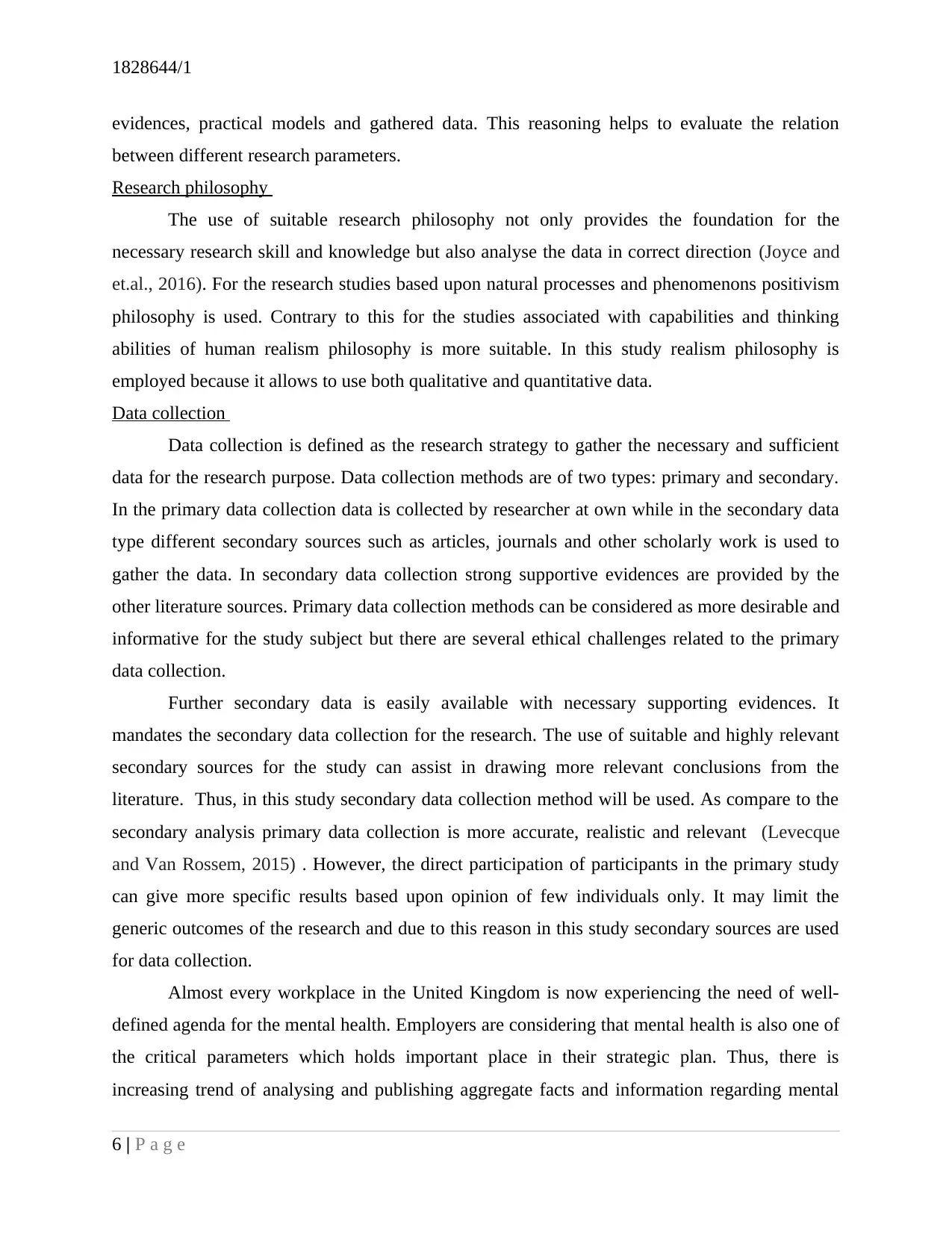
1828644/1
evidences, practical models and gathered data. This reasoning helps to evaluate the relation
between different research parameters.
Research philosophy
The use of suitable research philosophy not only provides the foundation for the
necessary research skill and knowledge but also analyse the data in correct direction (Joyce and
et.al., 2016). For the research studies based upon natural processes and phenomenons positivism
philosophy is used. Contrary to this for the studies associated with capabilities and thinking
abilities of human realism philosophy is more suitable. In this study realism philosophy is
employed because it allows to use both qualitative and quantitative data.
Data collection
Data collection is defined as the research strategy to gather the necessary and sufficient
data for the research purpose. Data collection methods are of two types: primary and secondary.
In the primary data collection data is collected by researcher at own while in the secondary data
type different secondary sources such as articles, journals and other scholarly work is used to
gather the data. In secondary data collection strong supportive evidences are provided by the
other literature sources. Primary data collection methods can be considered as more desirable and
informative for the study subject but there are several ethical challenges related to the primary
data collection.
Further secondary data is easily available with necessary supporting evidences. It
mandates the secondary data collection for the research. The use of suitable and highly relevant
secondary sources for the study can assist in drawing more relevant conclusions from the
literature. Thus, in this study secondary data collection method will be used. As compare to the
secondary analysis primary data collection is more accurate, realistic and relevant (Levecque
and Van Rossem, 2015) . However, the direct participation of participants in the primary study
can give more specific results based upon opinion of few individuals only. It may limit the
generic outcomes of the research and due to this reason in this study secondary sources are used
for data collection.
Almost every workplace in the United Kingdom is now experiencing the need of well-
defined agenda for the mental health. Employers are considering that mental health is also one of
the critical parameters which holds important place in their strategic plan. Thus, there is
increasing trend of analysing and publishing aggregate facts and information regarding mental
6 | P a g e
evidences, practical models and gathered data. This reasoning helps to evaluate the relation
between different research parameters.
Research philosophy
The use of suitable research philosophy not only provides the foundation for the
necessary research skill and knowledge but also analyse the data in correct direction (Joyce and
et.al., 2016). For the research studies based upon natural processes and phenomenons positivism
philosophy is used. Contrary to this for the studies associated with capabilities and thinking
abilities of human realism philosophy is more suitable. In this study realism philosophy is
employed because it allows to use both qualitative and quantitative data.
Data collection
Data collection is defined as the research strategy to gather the necessary and sufficient
data for the research purpose. Data collection methods are of two types: primary and secondary.
In the primary data collection data is collected by researcher at own while in the secondary data
type different secondary sources such as articles, journals and other scholarly work is used to
gather the data. In secondary data collection strong supportive evidences are provided by the
other literature sources. Primary data collection methods can be considered as more desirable and
informative for the study subject but there are several ethical challenges related to the primary
data collection.
Further secondary data is easily available with necessary supporting evidences. It
mandates the secondary data collection for the research. The use of suitable and highly relevant
secondary sources for the study can assist in drawing more relevant conclusions from the
literature. Thus, in this study secondary data collection method will be used. As compare to the
secondary analysis primary data collection is more accurate, realistic and relevant (Levecque
and Van Rossem, 2015) . However, the direct participation of participants in the primary study
can give more specific results based upon opinion of few individuals only. It may limit the
generic outcomes of the research and due to this reason in this study secondary sources are used
for data collection.
Almost every workplace in the United Kingdom is now experiencing the need of well-
defined agenda for the mental health. Employers are considering that mental health is also one of
the critical parameters which holds important place in their strategic plan. Thus, there is
increasing trend of analysing and publishing aggregate facts and information regarding mental
6 | P a g e
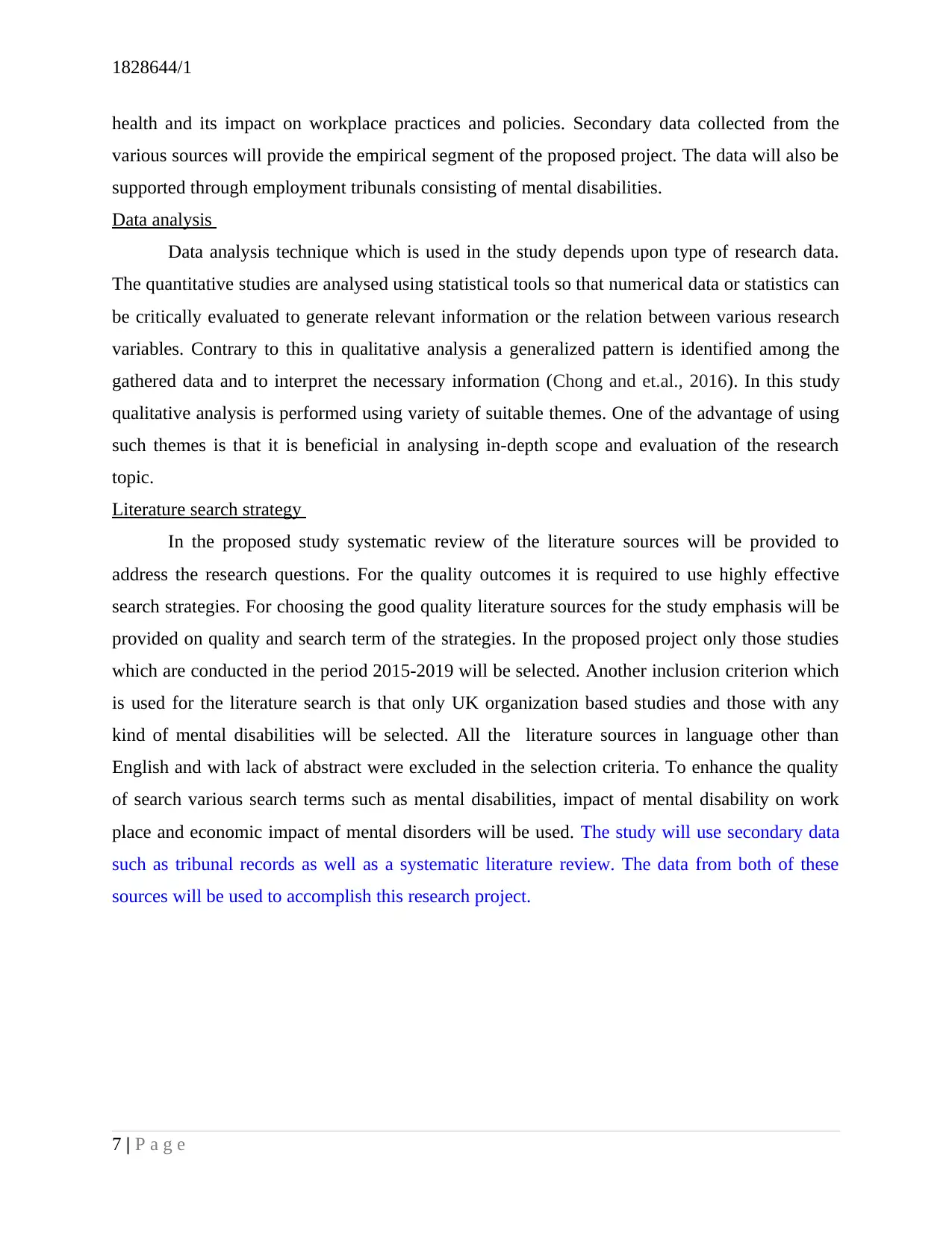
1828644/1
health and its impact on workplace practices and policies. Secondary data collected from the
various sources will provide the empirical segment of the proposed project. The data will also be
supported through employment tribunals consisting of mental disabilities.
Data analysis
Data analysis technique which is used in the study depends upon type of research data.
The quantitative studies are analysed using statistical tools so that numerical data or statistics can
be critically evaluated to generate relevant information or the relation between various research
variables. Contrary to this in qualitative analysis a generalized pattern is identified among the
gathered data and to interpret the necessary information (Chong and et.al., 2016). In this study
qualitative analysis is performed using variety of suitable themes. One of the advantage of using
such themes is that it is beneficial in analysing in-depth scope and evaluation of the research
topic.
Literature search strategy
In the proposed study systematic review of the literature sources will be provided to
address the research questions. For the quality outcomes it is required to use highly effective
search strategies. For choosing the good quality literature sources for the study emphasis will be
provided on quality and search term of the strategies. In the proposed project only those studies
which are conducted in the period 2015-2019 will be selected. Another inclusion criterion which
is used for the literature search is that only UK organization based studies and those with any
kind of mental disabilities will be selected. All the literature sources in language other than
English and with lack of abstract were excluded in the selection criteria. To enhance the quality
of search various search terms such as mental disabilities, impact of mental disability on work
place and economic impact of mental disorders will be used. The study will use secondary data
such as tribunal records as well as a systematic literature review. The data from both of these
sources will be used to accomplish this research project.
7 | P a g e
health and its impact on workplace practices and policies. Secondary data collected from the
various sources will provide the empirical segment of the proposed project. The data will also be
supported through employment tribunals consisting of mental disabilities.
Data analysis
Data analysis technique which is used in the study depends upon type of research data.
The quantitative studies are analysed using statistical tools so that numerical data or statistics can
be critically evaluated to generate relevant information or the relation between various research
variables. Contrary to this in qualitative analysis a generalized pattern is identified among the
gathered data and to interpret the necessary information (Chong and et.al., 2016). In this study
qualitative analysis is performed using variety of suitable themes. One of the advantage of using
such themes is that it is beneficial in analysing in-depth scope and evaluation of the research
topic.
Literature search strategy
In the proposed study systematic review of the literature sources will be provided to
address the research questions. For the quality outcomes it is required to use highly effective
search strategies. For choosing the good quality literature sources for the study emphasis will be
provided on quality and search term of the strategies. In the proposed project only those studies
which are conducted in the period 2015-2019 will be selected. Another inclusion criterion which
is used for the literature search is that only UK organization based studies and those with any
kind of mental disabilities will be selected. All the literature sources in language other than
English and with lack of abstract were excluded in the selection criteria. To enhance the quality
of search various search terms such as mental disabilities, impact of mental disability on work
place and economic impact of mental disorders will be used. The study will use secondary data
such as tribunal records as well as a systematic literature review. The data from both of these
sources will be used to accomplish this research project.
7 | P a g e
⊘ This is a preview!⊘
Do you want full access?
Subscribe today to unlock all pages.

Trusted by 1+ million students worldwide

1828644/1
8 | P a g e
8 | P a g e
Paraphrase This Document
Need a fresh take? Get an instant paraphrase of this document with our AI Paraphraser
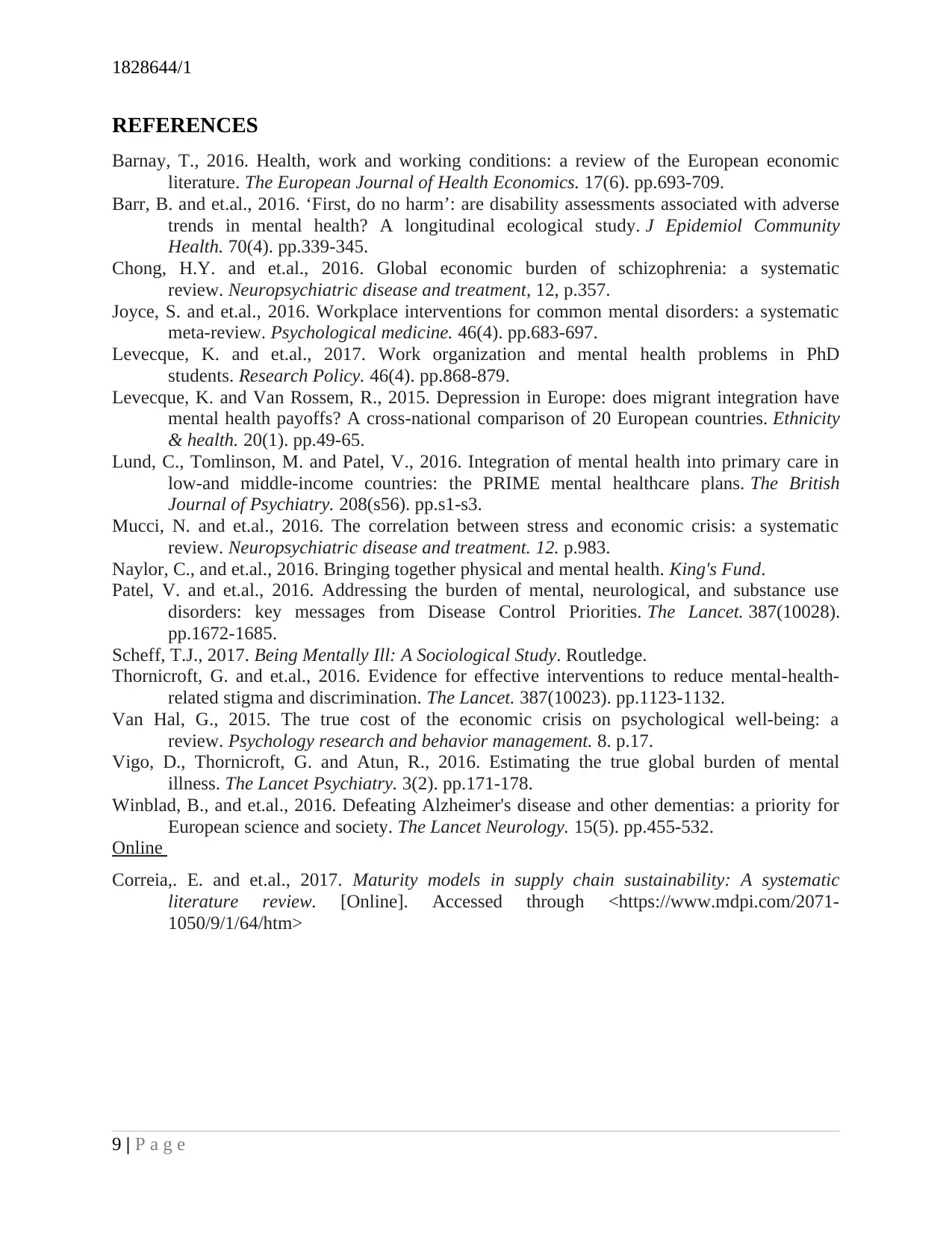
1828644/1
REFERENCES
Barnay, T., 2016. Health, work and working conditions: a review of the European economic
literature. The European Journal of Health Economics. 17(6). pp.693-709.
Barr, B. and et.al., 2016. ‘First, do no harm’: are disability assessments associated with adverse
trends in mental health? A longitudinal ecological study. J Epidemiol Community
Health. 70(4). pp.339-345.
Chong, H.Y. and et.al., 2016. Global economic burden of schizophrenia: a systematic
review. Neuropsychiatric disease and treatment, 12, p.357.
Joyce, S. and et.al., 2016. Workplace interventions for common mental disorders: a systematic
meta-review. Psychological medicine. 46(4). pp.683-697.
Levecque, K. and et.al., 2017. Work organization and mental health problems in PhD
students. Research Policy. 46(4). pp.868-879.
Levecque, K. and Van Rossem, R., 2015. Depression in Europe: does migrant integration have
mental health payoffs? A cross-national comparison of 20 European countries. Ethnicity
& health. 20(1). pp.49-65.
Lund, C., Tomlinson, M. and Patel, V., 2016. Integration of mental health into primary care in
low-and middle-income countries: the PRIME mental healthcare plans. The British
Journal of Psychiatry. 208(s56). pp.s1-s3.
Mucci, N. and et.al., 2016. The correlation between stress and economic crisis: a systematic
review. Neuropsychiatric disease and treatment. 12. p.983.
Naylor, C., and et.al., 2016. Bringing together physical and mental health. King's Fund.
Patel, V. and et.al., 2016. Addressing the burden of mental, neurological, and substance use
disorders: key messages from Disease Control Priorities. The Lancet. 387(10028).
pp.1672-1685.
Scheff, T.J., 2017. Being Mentally Ill: A Sociological Study. Routledge.
Thornicroft, G. and et.al., 2016. Evidence for effective interventions to reduce mental-health-
related stigma and discrimination. The Lancet. 387(10023). pp.1123-1132.
Van Hal, G., 2015. The true cost of the economic crisis on psychological well-being: a
review. Psychology research and behavior management. 8. p.17.
Vigo, D., Thornicroft, G. and Atun, R., 2016. Estimating the true global burden of mental
illness. The Lancet Psychiatry. 3(2). pp.171-178.
Winblad, B., and et.al., 2016. Defeating Alzheimer's disease and other dementias: a priority for
European science and society. The Lancet Neurology. 15(5). pp.455-532.
Online
Correia,. E. and et.al., 2017. Maturity models in supply chain sustainability: A systematic
literature review. [Online]. Accessed through <https://www.mdpi.com/2071-
1050/9/1/64/htm>
9 | P a g e
REFERENCES
Barnay, T., 2016. Health, work and working conditions: a review of the European economic
literature. The European Journal of Health Economics. 17(6). pp.693-709.
Barr, B. and et.al., 2016. ‘First, do no harm’: are disability assessments associated with adverse
trends in mental health? A longitudinal ecological study. J Epidemiol Community
Health. 70(4). pp.339-345.
Chong, H.Y. and et.al., 2016. Global economic burden of schizophrenia: a systematic
review. Neuropsychiatric disease and treatment, 12, p.357.
Joyce, S. and et.al., 2016. Workplace interventions for common mental disorders: a systematic
meta-review. Psychological medicine. 46(4). pp.683-697.
Levecque, K. and et.al., 2017. Work organization and mental health problems in PhD
students. Research Policy. 46(4). pp.868-879.
Levecque, K. and Van Rossem, R., 2015. Depression in Europe: does migrant integration have
mental health payoffs? A cross-national comparison of 20 European countries. Ethnicity
& health. 20(1). pp.49-65.
Lund, C., Tomlinson, M. and Patel, V., 2016. Integration of mental health into primary care in
low-and middle-income countries: the PRIME mental healthcare plans. The British
Journal of Psychiatry. 208(s56). pp.s1-s3.
Mucci, N. and et.al., 2016. The correlation between stress and economic crisis: a systematic
review. Neuropsychiatric disease and treatment. 12. p.983.
Naylor, C., and et.al., 2016. Bringing together physical and mental health. King's Fund.
Patel, V. and et.al., 2016. Addressing the burden of mental, neurological, and substance use
disorders: key messages from Disease Control Priorities. The Lancet. 387(10028).
pp.1672-1685.
Scheff, T.J., 2017. Being Mentally Ill: A Sociological Study. Routledge.
Thornicroft, G. and et.al., 2016. Evidence for effective interventions to reduce mental-health-
related stigma and discrimination. The Lancet. 387(10023). pp.1123-1132.
Van Hal, G., 2015. The true cost of the economic crisis on psychological well-being: a
review. Psychology research and behavior management. 8. p.17.
Vigo, D., Thornicroft, G. and Atun, R., 2016. Estimating the true global burden of mental
illness. The Lancet Psychiatry. 3(2). pp.171-178.
Winblad, B., and et.al., 2016. Defeating Alzheimer's disease and other dementias: a priority for
European science and society. The Lancet Neurology. 15(5). pp.455-532.
Online
Correia,. E. and et.al., 2017. Maturity models in supply chain sustainability: A systematic
literature review. [Online]. Accessed through <https://www.mdpi.com/2071-
1050/9/1/64/htm>
9 | P a g e

1828644/1
10 | P a g e
10 | P a g e
⊘ This is a preview!⊘
Do you want full access?
Subscribe today to unlock all pages.

Trusted by 1+ million students worldwide
1 out of 16
Related Documents
Your All-in-One AI-Powered Toolkit for Academic Success.
+13062052269
info@desklib.com
Available 24*7 on WhatsApp / Email
![[object Object]](/_next/static/media/star-bottom.7253800d.svg)
Unlock your academic potential
Copyright © 2020–2026 A2Z Services. All Rights Reserved. Developed and managed by ZUCOL.





